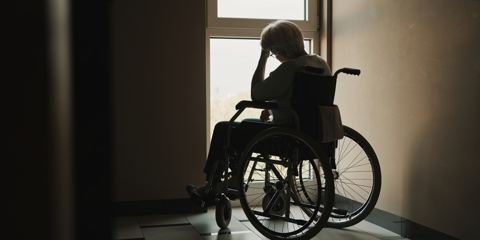When you think of nursing home abuse, you may think of nurses and other staff members causing the abuse. However, resident-on-resident abuse is also becoming common. As the name implies, this is when another resident in the nursing facility is causing the abuse.
This is a serious legal issue. A nursing home resident has the right to be free from abuse and neglect by anyone in the nursing home. This includes not only staff members but also other residents. This is federal law.
Resident-on-resident abuse is not something to be taken lightly. Like any other type of abuse, it can cause severe physical and emotional harm.
What is Resident-on-Resident Abuse?
Resident-on-resident abuse in senior homes may include any interaction (verbal, physical, or sexual) that is unwelcome and can potentially cause psychological and physical distress for the recipient.
Common cases of resident-to-resident abusive behavior in nursing homes include the following:
Physical abuse (biting, kicking, hitting, scratching)
Verbal abuse (screaming, cursing, name calling, verbal threats)
Sexual abuse (indecent exposure, unwelcome sexual advances, kissing, touching)
There are other types of abuse that may occur as well, such as destroying property, throwing items, or using threatening gestures.
Signs of resident-on-resident abuse include:
Unexplained bruises, scratches, or cuts
Broken bones or other injuries with no clear cause
Torn clothing or broken personal items
Frequent falls or complaints of being pushed or hit
Sudden withdrawal or fearfulness
Sudden changes in hygiene or behavior
Depression, anxiety, or mood swings
Avoidance of certain areas or residents
Sleep disturbances or nightmares
Bruising or bleeding in private areas
Complaints of inappropriate touching or gestures
Reports of yelling, name-calling, or threats from another resident
Reluctance to speak openly or be left alone
Decline in cognitive function not explained by medical conditions
Changes in eating habits
Causes of Resident-on-Resident Abuse
Resident-on-resident abuse in nursing homes often stems from multiple underlying factors. Common causes include:
Cognitive impairments. Dementia or Alzheimer’s can cause confusion and aggression, leading to unintentional or uncontrolled violent behavior.
Psychiatric disorders. Mental health issues like depression, bipolar disorder, or psychosis may contribute to aggression.
History of violence. Some residents may have a personal history of violent or abusive behavior.
Understaffing. Limited supervision allows conflicts to escalate unchecked, especially in common areas.
Poor staff training. Inadequately trained staff may fail to recognize early signs of aggression or intervene appropriately.
Environmental factors. Overcrowding, lack of privacy, and stressful surroundings can increase agitation.
Lack of structured activities. Boredom or frustration from inactivity can heighten the risk of confrontations.
Who is Liable?
Resident-on-resident abuse is more common in crowded facilities that are understaffed. Generally, the abuser is the one who is liable in these situations. However, nursing homes are required to protect their residents from harm and abuse. This means that it is the nursing home’s responsibility to ensure that residents refrain from harming each other.
Nursing homes are legally obligated to protect residents from mistreatment, abuse, and harm, whether the liable party is a staff member, visitor, or other resident. When a facility fails to take proper precautions, it can be held liable for resulting injuries. A key factor in determining liability is foreseeability, so if the abuse could have been anticipated and prevented, the nursing home may be responsible.
State and federal laws require nursing homes to assess new residents thoroughly at admission. This includes reviewing medical records and consulting with family or caregivers to identify behavioral risks. Failure to do so can be considered negligence.
If your loved one has suffered from resident-on-resident abuse, an experienced nursing home abuse attorney can help you gather evidence and pursue a liability claim. At Newman Law Group, LLP, we are committed to holding negligent facilities accountable and securing the compensation victims deserve.
What Nursing Homes Can Do
The following strategies can help nursing homes reduce the amount of resident-on-resident abuse:
Comprehensive assessments. Nursing homes should conduct detailed physical, cognitive, and behavioral assessments upon admission and at regular intervals afterward. These evaluations help identify residents who may be prone to aggression due to conditions like dementia, mental illness, or a history of violence.
Staff training. All staff should receive regular training on identifying signs of potential abuse, managing aggressive behavior, and responding to conflict. Training should cover de-escalation techniques, how to intervene safely, trauma-informed care, and communication strategies.
Increased supervision. Understaffing is a common factor in abuse cases. Nursing homes should maintain adequate staff-to-resident ratios to ensure that communal areas such as dining halls, lounges, and hallways are properly monitored. More supervision reduces opportunities for unsupervised interactions that could lead to abuse, while also enabling faster staff response during conflicts.
Behavioral interventions. Residents showing signs of aggression should be referred to mental health professionals for evaluation and support. Interventions may include counseling, psychiatric care, medication adjustments, and behavior management plans.
Environmental design. The physical layout of a nursing home can influence resident behavior. Facilities should minimize overcrowding, provide private or semi-private rooms, and create quiet zones. Clear signage, calming colors, and designated activity areas can reduce confusion and agitation, especially for residents with cognitive impairments.
Group activities. Structured, engaging activities tailored to residents’ interests and abilities can help reduce boredom, loneliness, and agitation. Group activities also offer supervised social interaction, which can foster positive relationships among residents and improve morale.
Clear reporting protocols. Nursing homes should establish and enforce strong policies for reporting, documenting, and investigating abuse incidents. Staff, residents, and family members should be encouraged to report concerns without fear of retaliation. Having a clear response plan ensures accountability and helps prevent future occurrences.
Contact Newman Law Group Today
Nursing home abuse can be perpetrated not only by staff members but also by other residents. This can be a frustrating situation, and obtaining compensation can be challenging.
A Sacramento elder abuse attorney from Newman Law Group, LLP, can assist you with your case. We strive to fight for justice and fair compensation in all types of elder abuse cases. Let’s discuss your situation and determine what options are best for you. Give us a call at (916) 352-3181 or fill out the online form to schedule a consultation.





